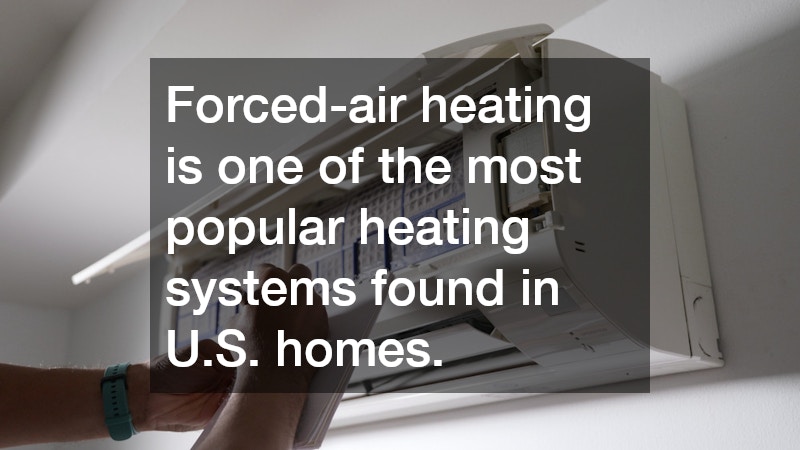Deciding on a heating system for your home is a critical choice that impacts your comfort and energy expenses. Today, homeowners have several residential HVAC services to choose from, each with its own set of advantages and considerations. This article explores the most common heating systems available and what they mean for your home.
Forced-Air Heating Systems
Forced-air heating is one of the most popular heating systems found in U.S. homes. This system works by heating air inside a furnace and then distributing it throughout the house via ductwork and vents. A key advantage of forced-air systems is their ability to also serve as a cooling system when connected to a central air conditioner. They are energy efficient but necessitate regular maintenance to keep them running optimally. Skilled residential HVAC services can ensure efficient annual servicing and repair of these systems to maintain their function.
Forced-air systems can vary significantly in terms of fuel sources, including natural gas, electricity, or oil. Each fuel type impacts the cost effectiveness and environmental footprint of the system. Natural gas, while initially more expensive to install, generally offers lower operating costs due to its efficiency compared to electric or oil counterparts. Despite these considerations, homeowners often find the flexibility of integrating smart thermostats appealing, which can optimize usage patterns based on daily habits. Residential HVAC services can advise on which fuel source would be most suitable for your home setup.
An additional consideration with forced-air systems is air quality. Unlike boilers or radiant heating systems, forced-air systems circulate air throughout the residence, which can stir up dust and allergens. It’s essential to change filters regularly to improve indoor air quality. Many modern residential HVAC services offer filtration enhancements that can capture finer particles and even help reduce allergens. Knowing how to optimize these systems can significantly impact the healthiness of your home environment.
Radiant Heating Systems
Radiant heating systems offer an alternative to forced air systems and are known for providing consistent and comfortable warmth. These systems work through a network of tubes installed beneath the floors or within walls, which are heated by hot water, electricity, or air. As the heat radiates from underneath, it warms the room evenly and silently, reducing noise pollution. Radiant systems are gaining popularity due to their energy efficiency and even heating distribution, which can also contribute to a lower energy bill. Homeowners often turn to specialized residential HVAC services for the installation and maintenance of these more complex systems.
Radiant heating excels in energy efficiency by eliminating air leakage issues common with ductwork-based systems. It’s also a preferred choice for homeowners aiming for a more silent and cleaner heating option since it doesn’t circulate dust and allergens. However, the initial installation cost is higher compared to forced-air systems, especially for existing homes where flooring might need modification. Despite the upfront costs, many find the long-term savings and improved comfort benefits promptly outweigh the initial expense. Residential HVAC services can provide detailed cost-benefit analyses to help decide if radiant heating is the right solution for you.
The comfort associated with radiant heating is often unmatched, since warmth is emanated consistently and uniformly. This can be especially beneficial in colder climates where traditional methods may leave certain areas of the home feeling cold. Homeowners appreciate the ability to focus warmth where it’s needed most, which is highly customizable in rooms with radiant heating. Residential HVAC services also offer options for retrofitting areas like bathrooms and kitchens to take advantage of this luxurious heating method. Overall, radiant heating presents a compelling blend of efficiency, comfort, and potential aesthetic value.
Heat Pumps
Heat pumps are increasingly recognized for their dual functionality, offering both heating and cooling, making them a versatile choice for temperate climates. This system extracts heat from outside sources like air, water, or the ground and moves it indoors. On warmer days, heat pumps reverse their function, acting as an air conditioner by expelling heat from inside the home. Their efficiency is unparalleled, as they simply transfer heat rather than generate it, which reduces energy consumption. Residential HVAC services often recommend heat pumps for areas with milder winters to maximize cost savings and reduce carbon emissions.
When considering heat pumps, understanding the different types is crucial. Air-source heat pumps, while the most common, might struggle in extremely cold temperatures. Ground-source or geothermal heat pumps tap into the earth’s consistent subterranean temperature, providing a more reliable option in colder regions. Though generally more expensive to install, geothermal systems are exceptionally efficient and bring substantial savings in the long term. Speaking with a qualified residential HVAC services provider can clarify whether a geothermal option is feasible for your home environment.
Besides being eco-friendly and cost-efficient, heat pumps contribute to a healthier home environment. They do not rely on combustion, which means fewer carbon monoxide risks compared to traditional gas furnaces. They can also be coupled with smart home technologies to enhance their efficiency and provide real-time data on energy usage. As heat pump technology continues to advance, residential HVAC services are equipped to retrofit existing systems and advise on the best technology for integrating into a smart home system. This ensures homeowners enjoy not only comfort but also peace of mind throughout the heating season.
In conclusion, selecting the appropriate heating system for your home depends on multiple factors including climate, energy efficiency, initial costs, and personal comfort preferences. Whether opting for a traditional forced-air system, efficient radiant heating, or a modern heat pump, it’s essential to consider both short-term and long-term benefits. Professional residential HVAC services can guide homeowners through the selection, installation, and maintenance processes effectively. With the right system in place, you can achieve both enhanced indoor comfort and energy savings. As technology evolves, staying informed about new options through reliable residential HVAC services ensures your home remains heated efficiently and sustainably.

